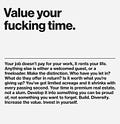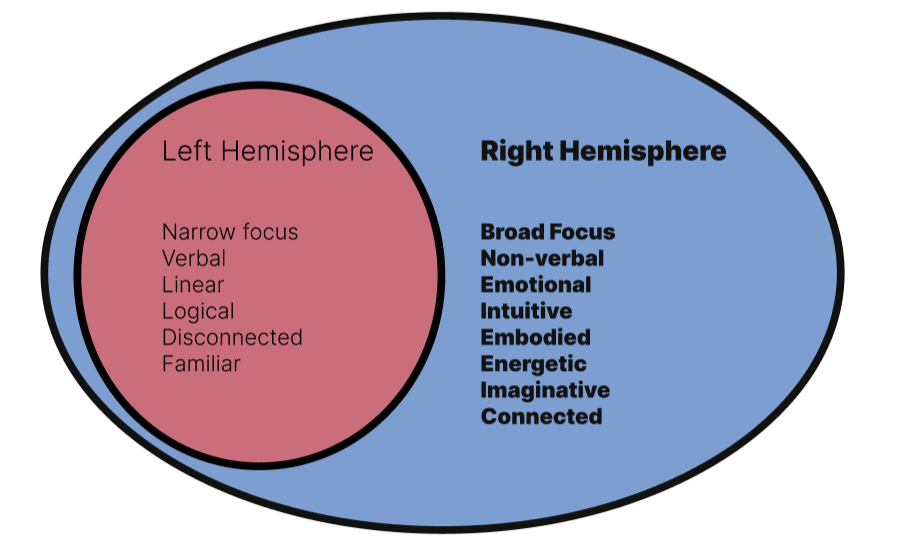The Curious Mind: How Have Markets Changed & What Will AI Do?, Eleven Wisdom Tools, Reframe Experience & Reshape Your Life, Complexity & Power Law in Investing, How To Succeed, Jensen on Computing....
October 16, 2024
I am sharing this weekly email with you because I count you in the group of people I learn from and enjoy being around.
What did you enjoy learning this week?
If you missed last week’s discussion: Marko & Luke on Markets, Politics and Global Order, Mental Health & Our Youth, Be More Interesting, How The Chip Industry Really Works, Charts You Missed, The Future of Robots....
This email takes many hours to put together, including hours of sourcing, curating and writing. If it is helpful to you, then do me a favor and hit the “heart” button so I know it’s useful to you.
Quotes I Am Thinking About:
“Just as a snake sheds its skin, we must shed our past over and over again.”
- Buddha
“If we are to achieve things never before accomplished we must employ methods never before attempted.”
- Francis Bacon
“The quieter you become, the more you can hear.”
- Baba Ram Dass
“Distractions are the assassins of great work. You don’t need more time; you need more focus. Time expands when we eliminate interruptions—our attention, not the clock, ultimately limits what we can achieve.”
- Farnam Street
"A good plan violently executed now is better than a perfect plan executednext week."
- General George S. Patton
A. A Few Things Worth Checking Out
1. Demetri Kofinas spoke with Adam Butler, the CIO of Resolve Asset Management in a super interesting interdisciplinary conversation,
They discussed the structural changes that our economy has undergone since the 2008 financial crisis and the mind-bending progress being made in artificial intelligence, how it is already disrupting multi-trillion-dollar industries.
The 5 BIG IDEAS:
The Evolution of Financial Markets and Monetary Policy: The increasing financialisation of the economy, where financial markets have become disproportionately large compared to the real economy. The potential long-term consequences of these policies, including: a) Increased moral hazard and risk-taking behavior b) Growing wealth inequality as asset owners benefit disproportionately c) The constraining of policy options due to market sensitivities d) Potential political backlash against central bank independence.
Misalignment of Incentives in Tech and Social Media: The current corporate governance model, focused on shareholder value maximization, creates misaligned incentives in tech and social media companies. Potential regulatory approaches, such as: a) Mandating algorithm transparency b) Implementing engagement limits (e.g., restricting content sharing) c) Exploring public ownership or control of key platforms
Rapid Advancements in AI Capabilities: The three main drivers of AI progress: training compute, inference compute, and algorithmic innovations. The shift from pure pattern recognition to more sophisticated reasoning capabilities in newer AI models. Specific advancements, such as: a) Longer context windows allowing for more comprehensive understanding b) The development of specialized "judge" models to evaluate AI outputs c) The potential for open-source development to accelerate progress
The Double-Edged Sword of AI's Impact: Positive impacts: a) Automating routine and unfulfilling "bullshit jobs" b) Enabling breakthroughs in scientific research and medical treatments c) Improving efficiency and problem-solving capabilities across industries. Negative impacts and risks: a) Rapid displacement of workers, potentially outpacing retraining capabilities b) Exacerbation of economic inequality if benefits are not widely distributed c) Potential misuse of AI for surveillance, manipulation, or warfare.
Rethinking Economic and Societal Goals in an AI-Driven World: The shift from a scarcity-based economic model to one of potential abundance. The need to move from "finite games" (win-lose scenarios) to "infinite games" focused on improving overall quality of life. Challenges to traditional notions of work, purpose, and value creation. The need for a broader societal conversation about the kind of future we want to create with AI.
2. Tom Morgan at Leading Edge is an expert in how we can bring more wisdom into our lives and this great post titled Eleven Wisdom Tools does just that.
It’s super useful and my favourite three tools:
“Energy Journal.” Keep a daily journal where you track what raises and lowers your energy levels.
“Life Experiments.” In all my years of coaching and research this has been easily the single most powerful tool. Can you create something enjoyable but vulnerable with the aim of helping others? Did you see a response or synchronicity after offering it to the world? This is the fastest way that you can proactively bring positive attractors into your own life.
“Reframing Your Reality.” The most “woo” practice also has the greatest potential impact. Treat the external world as conscious, intelligent and ultimately loving. As suggested by Dr. Mona Sobhani, look for lessons and patterns in your life within the context of prompts to make you more open and loving.
3. I discovered Derek Sivers about a decade ago through his amazing book notes and his interview with Tim Ferriss. He’s probably top 10 in the people in the world who have had an impact on my thinking and approach to life.
Plus he’s just an ultra cool and nice guy, who has always lived his life a little differently. I’m betting you haven’t heard of him.
He spoke to Chris Williamson at Modern Wisdom, in a conversation titled: The Unstoppable Power of Reframing Your Experiences.
The 4 BIG IDEAS:
Pragmatic Pluralism in Belief Systems: Rather than seeking a single, absolute truth, we can benefit from maintaining multiple, even contradictory beliefs simultaneously, deploying them contextually based on their usefulness. This "philosophical orchestra" approach allows for greater cognitive flexibility and more nuanced decision-making in complex situations.
Active Reality Construction Through Reframing: Our ability to consciously reframe experiences is not just a coping mechanism, but a powerful tool for actively shaping our reality and personal growth. By deliberately choosing more empowering interpretations, we can transform our lived experience and unlock new potentials.
Intellectual Anti-Fragility Through Cognitive Diversity: Actively seeking out and integrating diverse, conflicting worldviews doesn't just broaden our perspective - it makes our thinking more robust and "anti-fragile". This approach helps us thrive in uncertainty and complexity, turning intellectual challenges into opportunities for growth.
Strategic Minimalism as Empowerment: Viewing minimalism not as deprivation but as a deliberate strategy for building resilience, adaptability, and freedom. By reducing dependencies and needs, we expand our options and increase our capacity to pursue meaningful goals, turning constraints into catalysts for creativity and personal agency.
4. I dove deeply into learning more about John Candeto after hearing about him on the Talking Billions podcast, the conversation titled: The Importance of Survival, The Power Laws, The Study of Complexity in Investing.
He also has these amazing set of questions and quotes on his website.
For example some thoughtful ones:
If you could have the answer to any one question, what question would you want the answer to?
How do you measure yourself?
What do you wish you had told your younger self — that your younger self would have actually listened to?
The 5 BIG IDEAS:
The dual focus of long-term investing - survival and growth: Prioritise survival to continue playing the "infinite game" of investing and expose yourself to potential power law outcomes for wealth acceleration. Recognize that a small number of decisions/investments often drive the majority of results.
Time as the ultimate scarce resource and its implications: Time is the only asset we can't get more of and don't know how much we have. Structuring life to balance serendipity and intentionality maximizes the use of time. Importance of values-based living to guide time allocation and decision-making.
The power of learning in public and creating feedback loops: Sharing ideas publicly accelerates personal growth and learning. Maintaining an open and curious mindset facilitates continuous improvement. The importance of diverse information flows and connecting ideas from different domains
Complexity and adaptability in investing and decision-making: Understanding businesses and markets as complex adaptive systems. The importance of observing systems over time rather than relying on point-in-time data. The iterative nature of success and the value of continuous refinement
Evolving approaches to knowledge, problem-solving, and technology: Shift from memorization to asking quality questions in the age of AI. Balancing human creativity and relationships with technological advancements. Adapting investment strategies and analysis to a world increasingly driven by intangible assets
5. Dr. Julie Gurner is basically Wendy Rhodes from the show Billions.
She helps top CEOs, CFOs, and entrepreneurs manage their ambition, goals, and self-talk, and writes the Ultra Successful blog (which I have enjoyed being a paid subscriber to).
She was on the Run The Numbers podcast summarising a lot of her work.
The 5 BIG IDEAS:
Harness "haunting agitation" as a strategic advantage: Where do you feel a constant drive to learn more an engage, use that inability to "turn off" ambition as a powerful force. Channel this energy productively by setting clear, measurable goals and metrics.
Commit to going truly "all-in" on your goals: Understand the crucial difference between being motivated and fully committing. Be prepared for intense periods of immersion and focus ("sprints"). Accept that your life may look different from others', and develop resilience against external judgments. Recognize that going all-in often yields nonlinear returns, with the world "conspiring in your favor".
Leverage the strategic advantage of "boring" persistence: Embrace the power of doing unglamorous, repetitive work that others avoid. Develop systems and discipline to excel at crucial but mundane tasks. Understand that what appears boring externally often hides intense drive and focus. Use this willingness to tackle "boring" work as a competitive moat
Intelligently mitigate risk while maintaining full commitment: Create a robust "Plan A" with built-in contingencies instead of a separate "Plan B". Be willing to consider and plan for worst-case scenarios. Understand the difference between protecting your downside and having an "escape hatch".
Master strategic focus and the art of saying "no": Develop clear criteria for what truly aligns with your goals and values. Practice saying no gracefully to preserve time and energy for what matters most. Recognize that protecting your focus becomes increasingly crucial as you become more successful. Understand that success often comes from what you choose not to do, as much as what you choose to do
6. A deep read on an almost unifying theory of life, the universe and our place in it: Intimations of a New Worldview.
What is it about?
Brett proposes a new worldview rooted in complexity science, evolutionary theory, and cognitive science. It argues for a universal process of complexification underpinning reality, manifesting in biology as increasing non-zero-sum cooperation.
Humans have been evolutionarily selected for their ability to participate in this process through "relevance realization" - solving complex problems and facilitating cooperation. This process is personified in hero myths across cultures and may represent what our ancestors implicitly meant by "God."
He argues that engaging in this process is biologically and psychologically optimal, occurring at the border between order and chaos, and represents our participation in the ongoing creation of the universe.
Drawing on diverse sources including Jordan Peterson's work on mythology, John Vervaeke's cognitive science research, and contemporary physics, he suggests this worldview can address the "meaning crisis" in Western culture. It does so by re-establishing connections between mind and reality (nomological order), providing a participatory cosmic narrative (narrative order), and linking ontology to values (normative order).
He reframes humanity's role in the universe, suggesting that our actions can meaningfully impact cosmic history through participation in the complexification process.
Mind blowing stuff.
B. The Science and Technology Section:
1. Jensen Huang was a guest on the BG2 podcast.
We got an almost unfiltered view of Nvidia, but even more so of the trajectory of AI’s development as a technology and an industry.
They discussed Nvidia's approach to accelerating AI development through a holistic "flywheel" strategy. He explained that the key to AI advancement lies not just in faster chips, but in optimizing the entire data pipeline and machine learning process.
Nvidia focuses on accelerating every step of this flywheel, from data curation to inference, achieving performance improvements far beyond traditional Moore's Law expectations.
The company is building an integrated ecosystem, collaborating with suppliers and customers to drive unprecedented advancements in computing power, energy efficiency, and cost reduction.
Huang emphasizes the growing importance of inference in AI applications and how Nvidia is preparing for the massive computing demands this will require.
He also highlights Nvidia's internal use of AI agents across various functions, from chip design to cybersecurity, envisioning a future where biological and digital employees work together seamlessly.
This twitter post is a good summary.
P.S. Could you do me a favor ? This email takes many hours to put together, including hours of sourcing, curating and writing. If it is helpful to you, then do me a favor and hit the “heart” button so I know it’s useful to you.





Thank you for introducing me to Derek Sivers. His ideas on reframing and diversifying align with my recent thinking while on a spiritual sojourn about perspectives/points of view/vantages. These are perhaps the most important/powerful cognitive tools we possess - even if we don't fully understand, use, or control them.